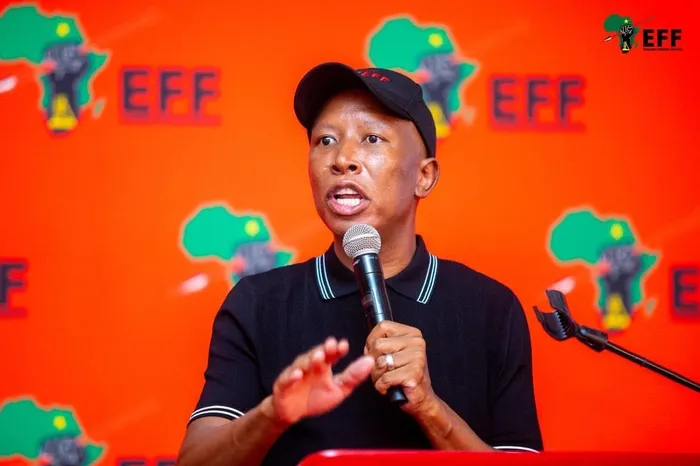'Useless and Wasteful': Malema demands deputy ministers be fired to save SA billions

Economic Freedom Fighters (EFF) leader Julius Malema has called for the removal of deputy ministers, claiming they are a waste of taxpayer money and contribute nothing to governance
Image: Facebook/EFF
Economic Freedom Fighters (EFF) leader Julius Malema has called for the scrapping of deputy minister positions, labelling them “useless” and suggesting their removal would save the government significant funds.
“They (referring to the ANC-led government) said, ‘Where are we going to get money to support this budget of South Africa?’ and we told them: fire deputy ministers — they are useless — and take that money and support the budget,” Malema said during a Workers’ Day rally at Zinniaville Sports Ground in Rustenburg, North West on Thursday.
Malema criticised the redundancy of some government roles, citing the Department of Forestry, Fisheries and the Environment.
“There is a department called the Department of (Forestry), Fisheries and the Environment — if I ask you who is the minister of fisheries, you don’t know… then the deputy minister is worse,” he said.
The department is currently led by Minister Dion George of the Democratic Alliance (DA), with Narend Singh of the Inkatha Freedom Party (IFP) serving as deputy minister.
Both parties are members of the Government of National Unity (GNU) coalition, led by the African National Congress (ANC).
Malema said the deputy ministers are a financial burden on the state, citing their access to vehicles, offices, residences, and staff in both Pretoria and Cape Town.
“When you ask what the role of this deputy minister is — nothing,” he said.
“And when they travel between Johannesburg and Pretoria or anywhere else, they don’t travel alone. They travel with a lot of staff members.”
Malema also questioned the need for certain ministries, including the Department of Science and Innovation.
“Innovation is education. Let it go to (the Department of) Higher Education and Training,” he said.
“Why do you need the Department of Basic Education and the Department of Higher Education? It must start from Grade R until you graduate under one department.”
He further questioned why the Departments of Social Development and Health should exist separately, saying the two could be combined to save money.
The EFF has strongly opposed the national budget, particularly a controversial 0.5 percentage point increase in value-added tax (VAT), arguing the fiscal plan does not serve the interests of Black South Africans.
The EFF and the DA, a GNU member, both voted against the budget.
Despite their opposition, the ANC-led government passed the budget with support from ActionSA, Build One South Africa (BOSA), the Patriotic Alliance (PA), Al Jama-ah, the IFP, and others.
However, the Western Cape High Court later ruled in favour of legal challenges brought by the DA and the EFF, scrapping the VAT hike.
“The resolutions of the National Assembly and the National Council of Provinces, adopted on April 2, 2025, to accept the report of the Standing Committee on Finance and the Select Committee on Finance, on the 2025 fiscal framework, are set aside,” the court ruled.
The court also ordered the Minister of Finance Enoch Godongwana to pay 50% of the DA’s legal costs, including the cost of two counsel.
The Speaker of the National Assembly, Thoko Didiza, and the Chairperson of the National Council of Provinces, Refilwe Mtsweni-Tsipane, were ordered to pay the remaining 50%, jointly and severally.
The same cost order was issued for the EFF’s case.
In a statement, Didiza said she had asked Godongwana to indicate when the revised budget would be presented, following the court’s ruling.
Godongwana announced that a new national budget will be tabled on May 21.
He confirmed the decision during a media briefing in Pretoria on Wednesday.
“The budget of March 12, 2025, and the proposed VAT increase sparked rigorous debate,” Godongwana said.
“This is welcomed in a healthy democracy. Today, there is clarity that VAT will remain at 15%. This decision was shaped not only by political debate but by the voices of the South African people.”
Godongwana acknowledged the complexities of the country’s new coalition governance, saying, “There are lessons to be learned by Cabinet, Legislature and ourselves.”
He said the National Treasury had already begun work on a revised fiscal framework that will stabilize debt while protecting key sectors such as education, health, and social grants.
“The revised budget will adhere to all established technical processes and consultations as set out in the Money Bills and Related Matters Act,” he said.
“This includes formal consultations with the Financial and Fiscal Commission, all political parties within the GNU, and Cabinet approval before presentation to Parliament.”
simon.majadibodu@iol.co.za
IOL Politics
